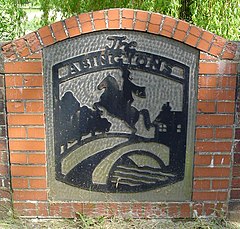Abington, Cambridgeshire
| The Abingtons: Great & Little Abington | |
|---|---|
 Little Abington |
|
| The Abingtons: Great & Little Abington shown within Cambridgeshire | |
| Population | 1,383 1354 (2011 Census) |
| OS grid reference | TL529487 |
| District | |
| Shire county | |
| Region | |
| Country | England |
| Sovereign state | United Kingdom |
| Post town | CAMBRIDGE |
| Postcode district | CB21 |
| Dialling code | 01223 |
| Police | Cambridgeshire |
| Fire | Cambridgeshire |
| Ambulance | East of England |
| EU Parliament | East of England |
| UK Parliament | |
The Abingtons are a community in South Cambridgeshire consisting of two villages: Little Abington and Great Abington, about 7 miles (11 km) south east of Cambridge.
Though often listed as a single entity, Great and Little Abington have since early medieval times been two parishes divided by the River Granta and remain so. The southernmost of the two, Great Abington, covers 1,588 acres (6.43 km2) and is bounded to the south by the county border with Essex, to the west by a branch of the Icknield Way (now the A11), and to the east by the parish of Hildersham. Little Abington covers 1,309 acres (5.30 km2), again bordered by the Icknield Way and Hildersham to the west and east, and by the ancient thoroughfare of Wool Street to the north.
The village history dates back to the Bronze Age, some 4000 years ago. The Saxons gave the village its name, originally called "Abba's Farm," and the village was listed as Abintone in the Domesday Book. The Great and Little came later, long after the two manors on either side of the river were allotted to different people at the Norman Conquest.
In the decades before the Second World War the Land Settlement Association created a site to the south of Great Abington consisting of over sixty houses and plots of land for unemployed miners mainly from the former shipyards of Tyneside and coalfields of Yorkshire and Durham.
The Cambridge to Haverhill railway line that opened in 1865 crossed Great Abington just south of the village, but closed in 1967. The medieval Cambridge to Colchester road that was the main route through the village was by-passed in the 1960s.
Great Abington's parish church has been dedicated to St Mary since at least the 16th century and comprises a chancel, nave with south aisle and porch, and west tower. The majority of the present building dates from the 13th century, possibly earlier, including the two-storey tower with short leaded spire.
...
Wikipedia

